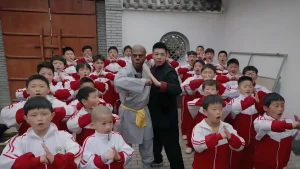After Using Rednote, TikTok Refugees Flock to China
TikTok refugees flooded Rednote, leading to many interesting stories. Now, these stories have continued.
Just last weekend, the Brecken family from Mississippi, USA, arrived in Shanghai and met their good friends “啊tiu” (Rednote username) whom they had met on Rednote, capturing a truly precious “century-old photo”.
In the photo, everyone’s faces were filled with happy smiles, as if they were born to play together harmoniously.
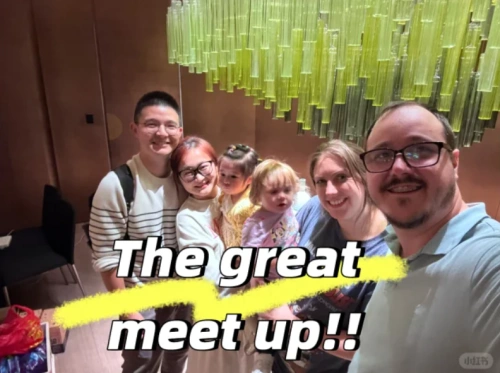
Their acquaintance stemmed from a romantic accident. Earlier this year, facing a crisis of closure, Brecken heard from other bloggers that Rednote was “a good opportunity to access the real lives of ordinary Chinese people,” so he curiously registered and posted the latest photo from his phone.
The photo of the father holding his daughter was quickly pushed in front of millions of families. Without prior arrangement, they opened their albums, selected family photos, uploaded them to the comments section, and greeted friends from across the ocean.
The most liked among them was the photo of the “啊tiu” family of three, along with the most classic “Hello”.
Later, this Rednote note screenshot was reposted on X with the caption “Isn’t this just how the world supposed to be?” The post garnered nearly 8 million views and topped the X hot list.
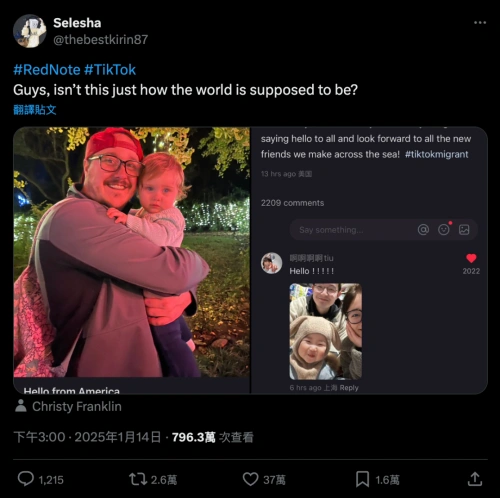
The owners of the two photos contacted each other immediately. The four parents created a group chat and enthusiastically chatted in the group every day, from sharing small food tips to practical parenting experiences. The more they talked, the more they regretted not meeting earlier, even though they did not speak the same language.
In the past, Brecken had very limited knowledge of China, thinking of it as a mysterious ancient country with the Great Wall and temples. His wife had never left Mississippi before and knew little about distant lands.
The communication with “啊tiu” parents and more sharing on Rednote showed them a more charming and authentic side of China, making them yearn more for this land.
In March, they finally set off to meet their distant friends and to see present-day China. Before departing, he eagerly went to trim his hair and beard, packed his bags and gifts, and excitedly counted down on Rednote.
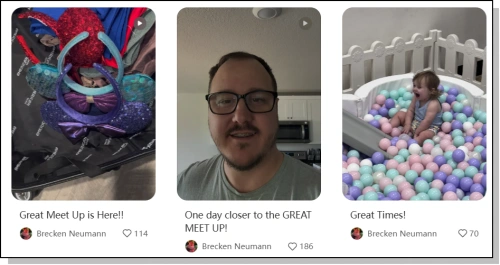
At the crowded Pudong Airport arrival gate, they waved vigorously, embraced with laughter, and exchanged gifts. The American guests crossed the ocean, bringing shiny sea turtle plush toys, custom sweaters with “Let’s be friends” printed on them; while the Chinese hosts reciprocated with seasonal flowers, freshly made Qingtuan, and a few heartfelt tokens.
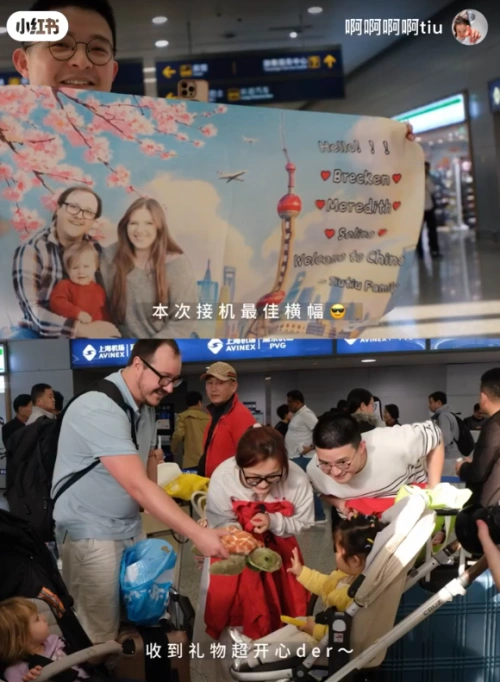
Adults with arms around each other, children holding hands. Everything felt so natural, as if life should always be like this.
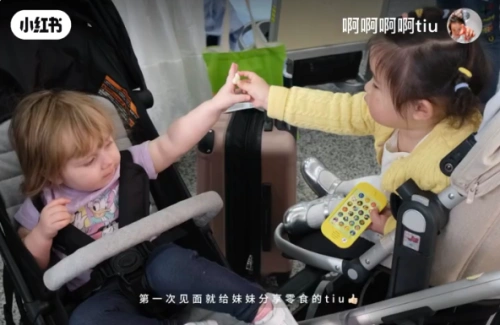
The Brecken family’s story is by no means unique. When he finally tasted the soup dumplings and dumplings he had been longing for, Italian game designer Federico returned to China with his mother.
Over thirty years ago, his mother and grandmother had been here. They had roamed the bustling streets of Beijing and experienced the sights of the prosperous farmer’s market in Xi’an. They marveled at how the majestic Great Wall of Beijing was built and were curious about the craftsmanship behind the Terracotta Warriors in Xi’an.

Growing up listening to his mother’s tales of this magical trip, he became curious about China. Recently, he found old videotapes from the past, organized and posted them on Rednote, garnering many heartfelt responses from Chinese netizens.
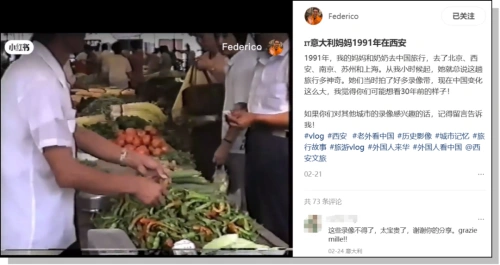
In this age of reflected images, many now reminisce about their childhoods through these videos. People look back at these images, reminiscing about the past that cannot be revisited, and recalling their carefree selves.
They pen down a series of sincere words, thanking him for his sharing and eagerly welcoming him and his mother to see present-day China, to experience the earth-shaking changes of these years. So, they set off once again.
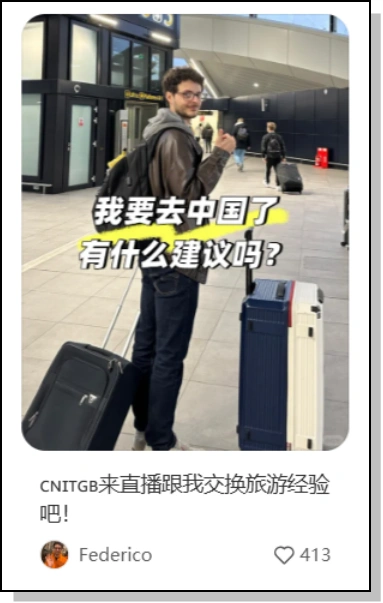
At this very moment, “Jiggly Boy,” the shaking boy, has been surrounded by the enthusiastic people of Shanghai. Many years ago, he danced a belly dance on the stands of the Timberwolves’ home court, becoming famous overnight. Many people don’t watch the NBA, don’t know his name, but remember his dance and recognize his face.
In the past, on social media overseas, he was attacked for his body, for his personal identity, and for many unexpected things. But on Rednote, his situation has improved greatly.
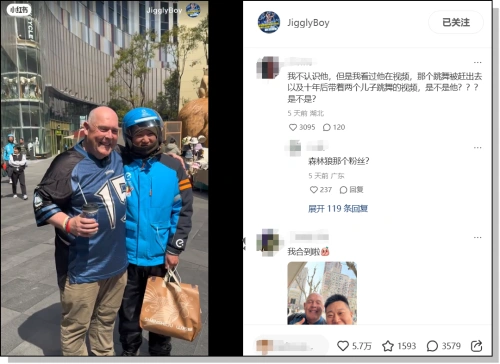
People here discuss music, cats, and many more loving and kind things. They emphasize the positive, optimistic aspects, rather than taking positions that create barriers between each other.
“They are very friendly and kind. They keep saying, ‘Come to China.’ So, we came.” Here truly did not disappoint him.
Similar to the atmosphere on Rednote, he received a warm welcome from his Chinese partners. Walking on the streets, many people were surprised to recognize him, then excitedly started dancing his classic dance as a way of greeting him.
It was like meeting an old friend after a long separation.
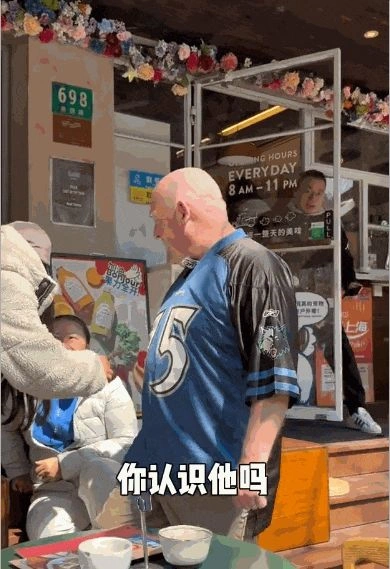
Professor Alex from the University of Leeds initially just wanted to take a look on Rednote to see what his students were up to, but he was quickly won over by the authentic food and restaurant recommendations, saying, “It understands my heart better than any other platform.”
Soon, he mastered the ways of Rednote on his own and began participating in this vast exchange of information. When he came across queries about the University of Leeds, he would proactively engage, indirectly contributing to the school’s content.
Not knowing where to shop in Shanghai himself, he sought advice from everyone, displaying a genuine willingness to listen to suggestions.

On his last day in China, he reluctantly recorded his final moments. A cautious Chinese netizen asked, “Are you reluctant to leave?” and received an affirmative response. The sincere interaction and her ID mirrored each other, becoming an integral part of the beauty in the world.
Indeed, that’s how it is. What people see on Rednote is not just the usual travel guides but rather authentic shares brimming with human emotions. What matters more is not the clear-cut disputes but the scattered rays of light about life. This has led everyone to step out of their information cocoons and enter each other’s real worlds.
Two months ago, people of different languages, races, and colors gathered from all directions, rebuilding a new Tower of Babel in Rednote’s virtual world. At that time, a statement from a netizen touched me deeply: “If there are truly irresistible factors that lead to our contact being lost again, we must remember the love and trust we had for each other at this moment. If there are any comments that defame each other in the future, we can firmly tell ourselves: what I see is not like that.”
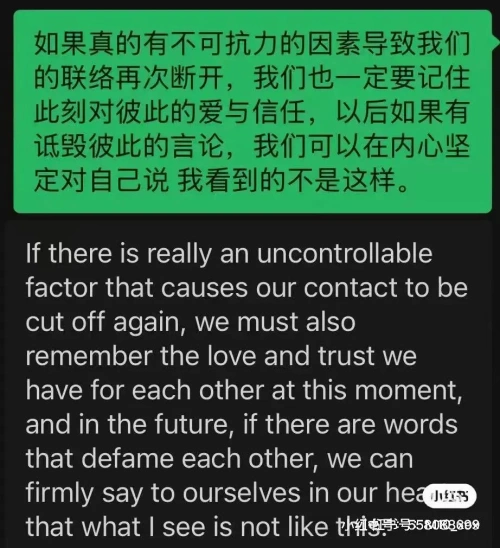
Now, two months have passed, and our connection has not only remained intact but has also seen more people continuing to write their stories through actions. American blogger Diane has been learning Chinese for three years and even makes vlogs in Chinese. Recently, she obtained a ten-year tourist visa for China, preparing to spend her summer here.

Teacher Marge also wants to visit her Rednote friends in China. She finds the people here lovely, patient in helping her choose a name and meticulously explaining the meanings of each word.
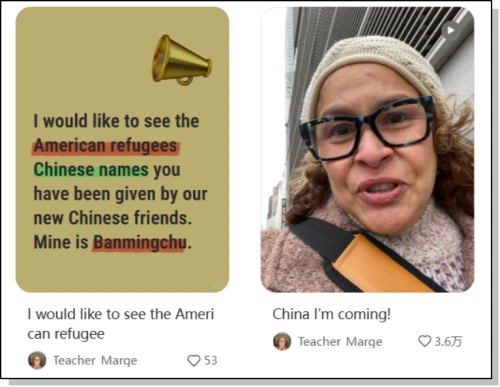
Anna, a German girl raised in Denmark, has also started collecting travel advice from Chinese netizens.
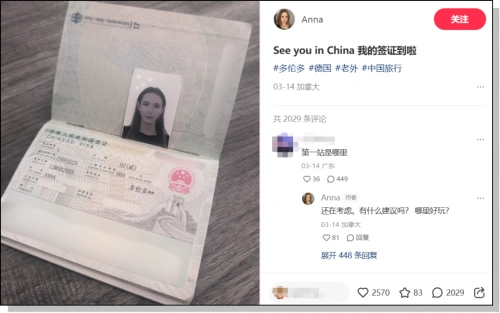
Their reasons for wanting to set off may seem different—purely for travel, perhaps a long-awaited honeymoon, or just to visit distant friends—yet what unites them is being touched by the authentic Chinese life presented on Rednote. This authenticity is leading to connections between people, heading towards new possibilities.
What is even more heartwarming is that the stories are not limited to “foreigners arriving for the first time.” Among the foreigners who flooded Rednote earlier this year, many were old friends who had been to China before. Before these trends emerged, they had already verified the friendly and inclusive nature of the culture through personal experiences.
American Mike Junior has seen the neon lights of the Oriental Pearl Tower at night and hiked the Great Wall carrying a bag that reads “Serve the People,” but what often strikes him the most is the stunning speed of the high-speed trains.

When Austrian girl Ella visited Chengdu last time, she tried on Hanfu for the first time. She posted these photos on Rednote and received a string of compliments. Everyone affectionately called her “Foreign Fairy.”
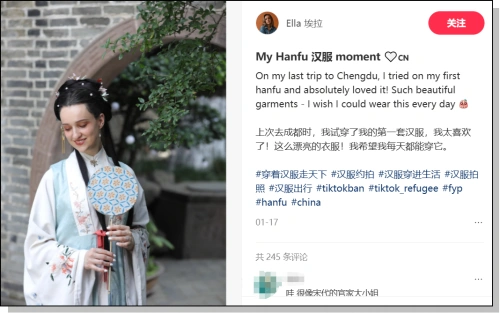
The traditional Chinese game of Mahjong has also become an important prop for cultural exchange. French friend “小猪猪18”(Rednote username) wreaked havoc at the Mahjong table in Chengdu and couldn’t stop playing.
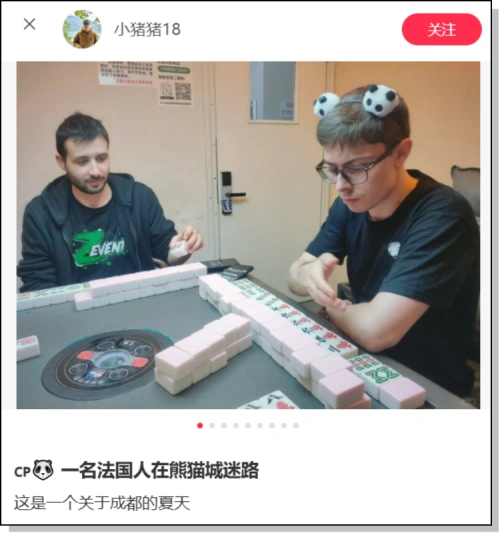
Andy Natlum rented a house in China and followed Chinese customs to celebrate the Spring Festival, writing couplets and watching the Spring Festival Gala. Foreigners are becoming more like locals.

Meanwhile, for the third time, Chilean travel blogger “飞鸽Feige” (Rednote username) chose to venture off the beaten path and set his destination for Guiyang after a 40-hour journey. He said he wanted to see more facets of China.
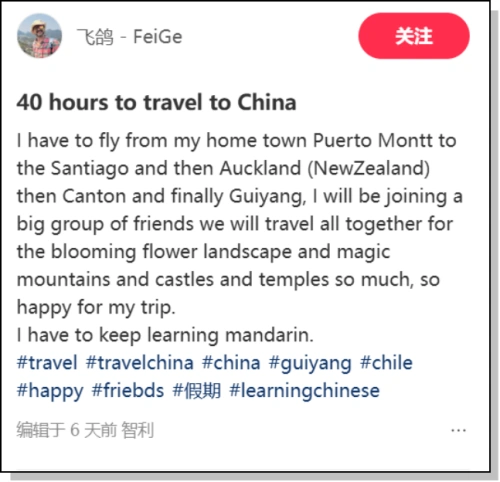
While politicians are still debating what should be restricted and what shouldn’t, ordinary people have already begun to enjoy the genuine warmth of human life. In a trance, it feels as though the world has leaped directly from the year 2000 to now, with the power struggles and confrontations of the past twenty years disappearing. The Earth is still the same global village, and we are all still envisioning a bright future.
Today, as the curiosity wave recedes, people are more focused on genuine individuals. They no longer view each other as mere “sights” to be observed but truly begin to communicate, to share the real, steady flow of life with each other.
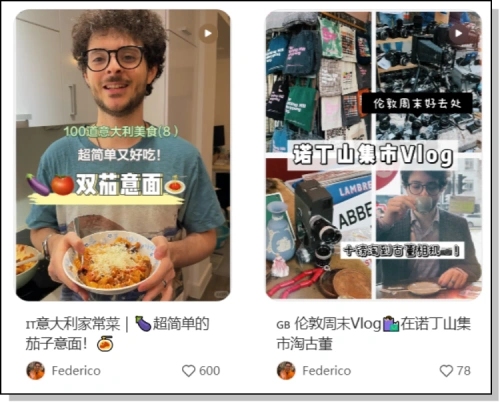
What we are witnessing is an elevation in communication. Just as we eagerly plan a trip to a certain place after stumbling upon restaurant recommendations in Guiyang, ancient building maps in Shanxi, or desiring to meet like-minded individuals, these international friends have come here for the same reasons.
What they feel on Rednote is not just the allure of a foreign culture but a resonance with real life. It is this authenticity that makes foreign friends from afar feel a sense of closeness. Jiggly Boy has a lot to say about this.
Over the past few years, he has witnessed the rise of social media and realized how their emergence has changed people’s behavior. Through online interactions, netizens gradually fail to realize they are communicating with real individuals and thus launch aggressive attacks, leading to today’s internet being filled with emotions, hostility, arguments, and stances, turning many matters into clashes between different viewpoints, especially after the introduction of algorithms.
Algorithms discovered that content filled with negative emotions, panic-inducing, and divisive tendencies is more likely to spread, leading to the rampant spread of rumors and conspiracy theories online. In “Homo Deus,” a tragic incident caused by an algorithm is mentioned. In 2016, the Burmese military and Buddhist extremists launched a large-scale ethnic violence event, killing 7,000-20,000 civilians.
After a UN investigation, it was concluded that “Facebook played a ‘determining role’ in the events – the artificial intelligence algorithms actively reinforced and promoted the content on the Facebook platform, inciting discrimination, hatred, and violence against Myanmar’s Muslim ethnic group.”
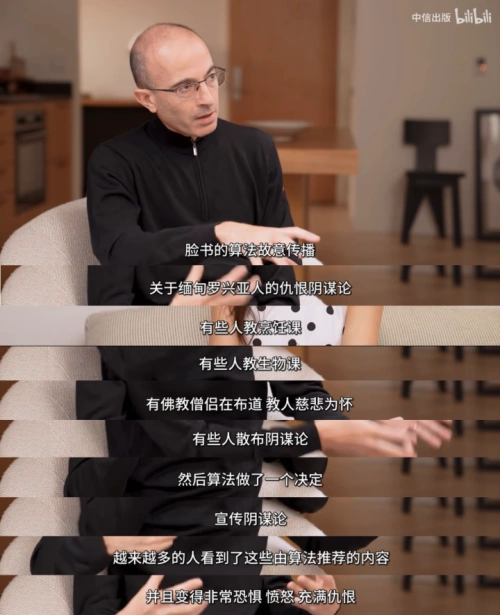 Yuval Harari, the author of Nexus, explains how algorithms promote conspiracy theories against Myanmar’s Muslim ethnic group.
Yuval Harari, the author of Nexus, explains how algorithms promote conspiracy theories against Myanmar’s Muslim ethnic group.
However, the atmosphere that Jiggly Boy experiences on Rednote is completely different, resembling the pre-social media prevalent online ecosystem: “Just like in a theater, people of different beliefs will laugh uproariously at the same joke.” While Western social media platforms are busy amplifying biases and sparking conflicts using algorithms, Chinese netizens on Rednote are using down-to-earth expressions to authentically showcase their lives, bringing those faces blurred by the internet back into focus, embodying vivid, flesh-and-blood individuals.
“Everyone has a place, everyone has a voice, everyone can be heard and listened to. I like it when an ordinary person can share, and then we say, ‘I see you, I hear you, you are important, you’re great.’”
People showcase themselves here and understand others. Therefore, the connections being established are not between me and a group, a faction, but between me and you, between people.
This genuine, strong, and touch-filled connection is rewriting the internet fairy tale of the new era – where someone is willing to traverse great distances not just to climb the Great Wall, see the Oriental Pearl Tower, or reunite with long-lost friends, but also to not disappoint the pure and lively hearts that still exist amidst the turmoil of this era.
Editor: Leo Cai


